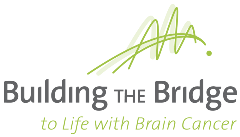Building the Bridge resources

Building the Bridge to Life with Brain Cancer is a resource developed to support people getting on with living and doing the things most important to them.
You can access Building the Bridge online or request a hard copy via email.
Email: buildingthebridge@austin.org.au
Videos
We have also created four short videos focusing on different challenges when you have a diagnosis of brain tumour or brain cancer.
Adjusting to a new diagnosis
People share their thoughts about being diagnosed with brain cancer, and what they did to get their heads around it.
What has helped along the way
People share ideas about what helped them to get on with the things most important to them, how they coped and moved forward with life.
Worrying about scans
Regular scans are part of life with brain cancer. In this video people share their thoughts about how they cope and manage their worries about scans.
The Fatigue Factor
Occupational Therapist, Dianne Legge presents tips and strategies for managing fatigue during and after treatment.